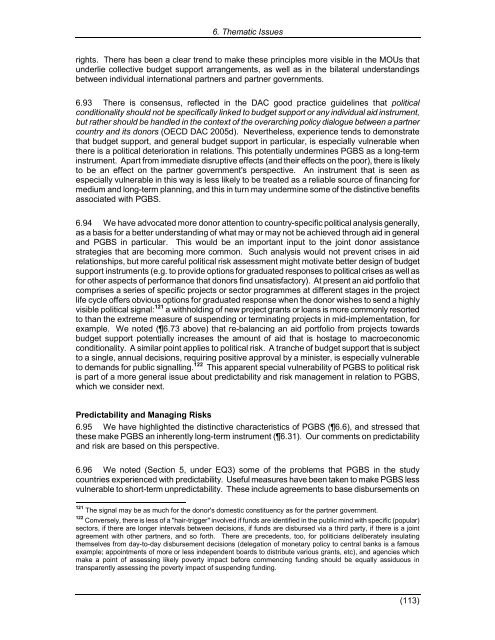Evaluation of General Budget Support: Synthesis Report - Belgium
Evaluation of General Budget Support: Synthesis Report - Belgium
Evaluation of General Budget Support: Synthesis Report - Belgium
Create successful ePaper yourself
Turn your PDF publications into a flip-book with our unique Google optimized e-Paper software.
6. Thematic Issues<br />
rights. There has been a clear trend to make these principles more visible in the MOUs that<br />
underlie collective budget support arrangements, as well as in the bilateral understandings<br />
between individual international partners and partner governments.<br />
6.93 There is consensus, reflected in the DAC good practice guidelines that political<br />
conditionality should not be specifically linked to budget support or any individual aid instrument,<br />
but rather should be handled in the context <strong>of</strong> the overarching policy dialogue between a partner<br />
country and its donors (OECD DAC 2005d). Nevertheless, experience tends to demonstrate<br />
that budget support, and general budget support in particular, is especially vulnerable when<br />
there is a political deterioration in relations. This potentially undermines PGBS as a long-term<br />
instrument. Apart from immediate disruptive effects (and their effects on the poor), there is likely<br />
to be an effect on the partner government's perspective. An instrument that is seen as<br />
especially vulnerable in this way is less likely to be treated as a reliable source <strong>of</strong> financing for<br />
medium and long-term planning, and this in turn may undermine some <strong>of</strong> the distinctive benefits<br />
associated with PGBS.<br />
6.94 We have advocated more donor attention to country-specific political analysis generally,<br />
as a basis for a better understanding <strong>of</strong> what may or may not be achieved through aid in general<br />
and PGBS in particular. This would be an important input to the joint donor assistance<br />
strategies that are becoming more common. Such analysis would not prevent crises in aid<br />
relationships, but more careful political risk assessment might motivate better design <strong>of</strong> budget<br />
support instruments (e.g. to provide options for graduated responses to political crises as well as<br />
for other aspects <strong>of</strong> performance that donors find unsatisfactory). At present an aid portfolio that<br />
comprises a series <strong>of</strong> specific projects or sector programmes at different stages in the project<br />
life cycle <strong>of</strong>fers obvious options for graduated response when the donor wishes to send a highly<br />
visible political signal: 121 a withholding <strong>of</strong> new project grants or loans is more commonly resorted<br />
to than the extreme measure <strong>of</strong> suspending or terminating projects in mid-implementation, for<br />
example. We noted (6.73 above) that re-balancing an aid portfolio from projects towards<br />
budget support potentially increases the amount <strong>of</strong> aid that is hostage to macroeconomic<br />
conditionality. A similar point applies to political risk. A tranche <strong>of</strong> budget support that is subject<br />
to a single, annual decisions, requiring positive approval by a minister, is especially vulnerable<br />
to demands for public signalling. 122 This apparent special vulnerability <strong>of</strong> PGBS to political risk<br />
is part <strong>of</strong> a more general issue about predictability and risk management in relation to PGBS,<br />
which we consider next.<br />
Predictability and Managing Risks<br />
6.95 We have highlighted the distinctive characteristics <strong>of</strong> PGBS (6.6), and stressed that<br />
these make PGBS an inherently long-term instrument (6.31). Our comments on predictability<br />
and risk are based on this perspective.<br />
6.96 We noted (Section 5, under EQ3) some <strong>of</strong> the problems that PGBS in the study<br />
countries experienced with predictability. Useful measures have been taken to make PGBS less<br />
vulnerable to short-term unpredictability. These include agreements to base disbursements on<br />
121 The signal may be as much for the donor's domestic constituency as for the partner government.<br />
122 Conversely, there is less <strong>of</strong> a "hair-trigger" involved if funds are identified in the public mind with specific (popular)<br />
sectors, if there are longer intervals between decisions, if funds are disbursed via a third party, if there is a joint<br />
agreement with other partners, and so forth. There are precedents, too, for politicians deliberately insulating<br />
themselves from day-to-day disbursement decisions (delegation <strong>of</strong> monetary policy to central banks is a famous<br />
example; appointments <strong>of</strong> more or less independent boards to distribute various grants, etc), and agencies which<br />
make a point <strong>of</strong> assessing likely poverty impact before commencing funding should be equally assiduous in<br />
transparently assessing the poverty impact <strong>of</strong> suspending funding.<br />
(113)

















